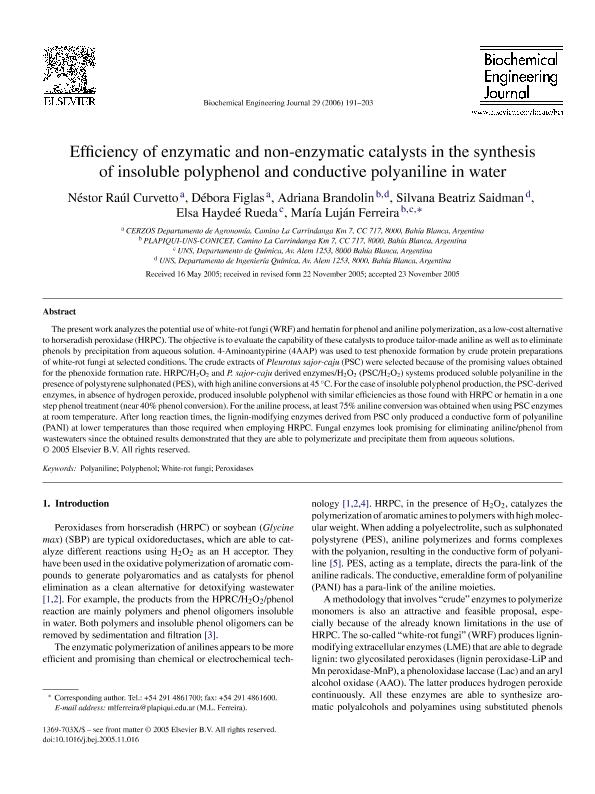Artículo
Efficiency of enzymatic and non-enzymatic catalysts in the synthesis of insoluble polyphenol and conductive polyaniline in water
Curvetto, Nestor Raul ; Figlas, Norma Débora; Brandolin, Adriana
; Figlas, Norma Débora; Brandolin, Adriana ; Saidman, Silvana Beatriz
; Saidman, Silvana Beatriz ; Rueda, Elsa Haydee; Ferreira, María Luján
; Rueda, Elsa Haydee; Ferreira, María Luján
 ; Figlas, Norma Débora; Brandolin, Adriana
; Figlas, Norma Débora; Brandolin, Adriana ; Saidman, Silvana Beatriz
; Saidman, Silvana Beatriz ; Rueda, Elsa Haydee; Ferreira, María Luján
; Rueda, Elsa Haydee; Ferreira, María Luján
Fecha de publicación:
04/2006
Editorial:
Elsevier Science Sa
Revista:
Biochemical Engineering Journal
ISSN:
1369-703X
Idioma:
Inglés
Tipo de recurso:
Artículo publicado
Clasificación temática:
Resumen
The present work analyzes the potential use of white-rot fungi (WRF) and hematin for phenol and aniline polymerization, as a low-cost alternative to horseradish peroxidase (HRPC). The objective is to evaluate the capability of these catalysts to produce tailor-made aniline as well as to eliminate phenols by precipitation from aqueous solution. 4-Aminoantypirine (4AAP) was used to test phenoxide formation by crude protein preparations of white-rot fungi at selected conditions. The crude extracts of Pleurotus sajor-caju (PSC) were selected because of the promising values obtained for the phenoxide formation rate. HRPC/H2O2 and P. sajor-caju derived enzymes/H2O2 (PSC/H2O2) systems produced soluble polyaniline in the presence of polystyrene sulphonated (PES), with high aniline conversions at 45 °C. For the case of insoluble polyphenol production, the PSC-derived enzymes, in absence of hydrogen peroxide, produced insoluble polyphenol with similar efficiencies as those found with HRPC or hematin in a one step phenol treatment (near 40% phenol conversion). For the aniline process, at least 75% aniline conversion was obtained when using PSC enzymes at room temperature. After long reaction times, the lignin-modifying enzymes derived from PSC only produced a conductive form of polyaniline (PANI) at lower temperatures than those required when employing HRPC. Fungal enzymes look promising for eliminating aniline/phenol from wastewaters since the obtained results demonstrated that they are able to polymerizate and precipitate them from aqueous solutions.
Palabras clave:
Peroxidases
,
Polyaniline
,
Polyphenol
,
White-Rot Fungi
Archivos asociados
Licencia
Identificadores
Colecciones
Articulos(CCT - BAHIA BLANCA)
Articulos de CTRO.CIENTIFICO TECNOL.CONICET - BAHIA BLANCA
Articulos de CTRO.CIENTIFICO TECNOL.CONICET - BAHIA BLANCA
Articulos(CERZOS)
Articulos de CENTRO REC.NAT.RENOVABLES DE ZONA SEMIARIDA(I)
Articulos de CENTRO REC.NAT.RENOVABLES DE ZONA SEMIARIDA(I)
Articulos(PLAPIQUI)
Articulos de PLANTA PILOTO DE INGENIERIA QUIMICA (I)
Articulos de PLANTA PILOTO DE INGENIERIA QUIMICA (I)
Citación
Curvetto, Nestor Raul; Figlas, Norma Débora; Brandolin, Adriana; Saidman, Silvana Beatriz; Rueda, Elsa Haydee; et al.; Efficiency of enzymatic and non-enzymatic catalysts in the synthesis of insoluble polyphenol and conductive polyaniline in water; Elsevier Science Sa; Biochemical Engineering Journal; 29; 3; 4-2006; 191-203
Compartir
Altmétricas



